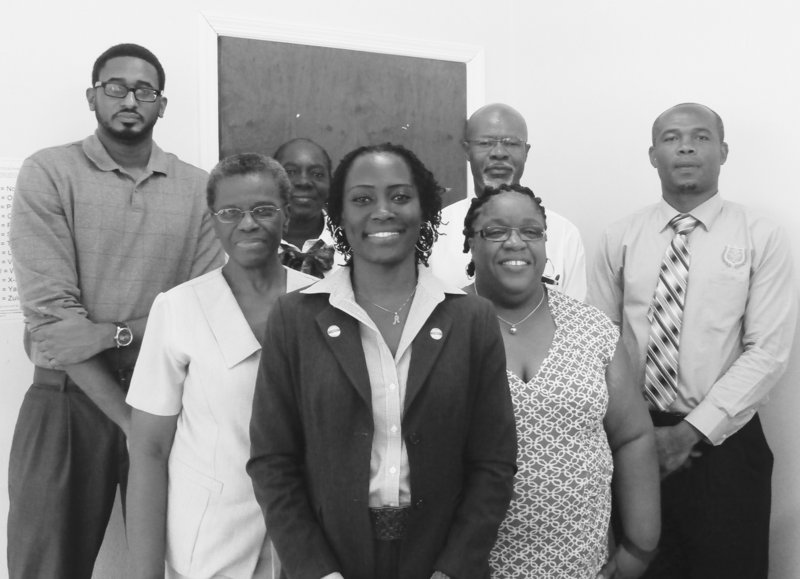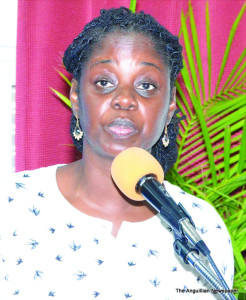
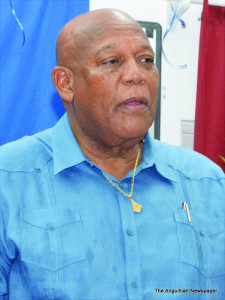
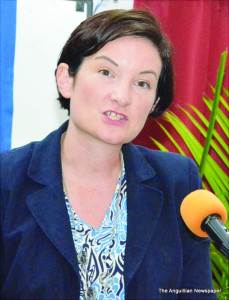
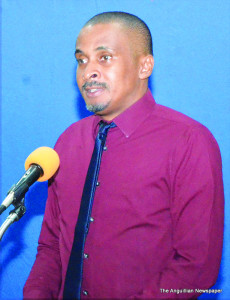
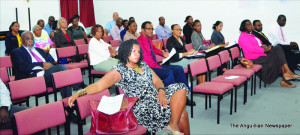 The people of Anguilla have been told about the Government’s priorities for the next three years – 2016-2018 – called the Medium Term Plan under the Framework for Fiscal Sustainability and Development as mandated by the UK Government.
The people of Anguilla have been told about the Government’s priorities for the next three years – 2016-2018 – called the Medium Term Plan under the Framework for Fiscal Sustainability and Development as mandated by the UK Government.
The plan, including various policy decisions for the growth and development of Anguilla, was outlined on Tuesday and Wednesday, this week, during a series of presentations at the Teachers’ Resource Centre by senior public servants in the various Ministries.
Speaking at the opening ceremony, chaired by Ms. Anthea Ipinson, Chief Projects Officer in the Ministry of Finance, Dr. Aidan Harrigan, Permanent Secretary, Finance, said in part: “In 2013 the Government of Anguilla finalised negotiations with the UK Government for a Framework for Fiscal Sustainability and Development. The framework enshrines the concept of Medium Term Planning to the extent that not only do we have to develop such plans, but they have to be presented to, and debated in, the House of Assembly. In fact this plan, in the not-too-distant future, will be debated in the House.”
Dr. Harrigan explained that Medium Term Planning “is accepted as best practice by all the various bodies” in the public sector. He went on: “It allows you to view things in a context and to approach them strategically. Looking back quickly, in Anguilla we would have had to deal with the fiscal crisis which started in 2008 which mushroomed in 2009 when we would have ended the year with a fiscal deficit of EC$70 million. We also would have had a negative economic growth running from 2008 to 2012 and, of course, we also had the banking crisis which manifested itself in 2013 when the Central Bank intervened. One of the questions to be asked is – how do you get through such episodes especially in a small island like ours? Part of the answer to that is to plan how to address the things which are immediately in front of you – like economic shocks and environmental shocks…”
He urged all presenters to give robust contributions to the plan and invited members of the public to provide any necessary feedback.
Governor Christina Scott joined Dr. Harrigan in echoing his sentiments about the importance of the discussion on such a wide-ranging series of matters of public interest, and how the Government manages the people’s money. She commended the officials in the Ministry of Finance for their enormous work in preparing their presentations.
“The UK Government shares very strongly the views of the Government that Anguilla should have a strong, stable and resilient economy that can withstand shocks and offers Anguillians the opportunity to enjoy fulfilling, healthy lives,” she stated. The Governor said it was difficult not to mention the banking resolution, the enormous amount of work which was done towards that end, and the varying views and the strength of feeling among the public.
“What I am confident about is that the difficult set of decisions that the Government of Anguilla has taken now provide a framework that offers a very good one to move forward. Of course the resolution and the successful formation of a strong National Commercial Bank of Anguilla, under a strong and independent Board, is not the end of the journey. In a sense, it is just the beginning of a journey…Throughout the period before the banking resolution there were a set of discussions, which went on in parallel between the UK Government and the Government of Anguilla, about the importance of ensuring strong economic growth and development for Anguilla. I really do commend the Chief Minister, and the Ministers in Executive Council, for setting out the Medium Term Economic and Fiscal Plan and the set of reforms the Government of Anguilla has committed itself to delivering over the next three years.”
Chief Minister Banks acknowledged with gratitude that the public servants, especially in the Ministry of Finance, had been working hard over the past days to ensure the Medium Term presentations would take place. He went on: “The plan represents a very important step in building a stronger relationship with the community as well as with the UK Government, in putting in place a plan that they” [the UK Government] would have agreed to and that we would be obliged, based on our agreement, to implement. The plan includes various aspects such as governance issues, public finance, economic development and social issues.
“I am particularly pleased that we have the opportunity, among the discussions on the Medium Term Economic and Fiscal Plan, to deal with some initiatives, especially surrounding the promotion of inward investment and economic growth, such as a review of the Trade and Investment Unit and the Commerce Unit functions. This is with the view of a possible amalgamation into a combined Trade, Investment and Commerce Unit into a one stop shop of foreign direct investment. It is important that for a small economy like ours that we continue to attract investment from overseas because, obviously, the kind of resources that we have locally might not be able to respond to the needs we have.
“Because we are a very open economy and susceptible to all kinds of shocks, we need not only to be able to manage those external shocks, but also seize the opportunities that exist as a result of what situation we find ourselves in. We have to continue to be creative; to find ways and means to make the best of whatever it is – a bad thing or a good thing – in furthering the goals and aspirations of the people of Anguilla.”
The Chief Minister said the Government also had an opportunity to look at time lines for the introduction of a number other plans as a result of the Medium Term Plan. These include specific plans related to business development which should, hopefully, be in place by December 2017 – and the continued implementation of the Sustainable Tourism Plan to include the yachting industry. “I have determined that we should take full advantage of this – also medical tourism and sports tourism projects which we need to include in our diversification of the tourism sector,” Mr. Banks added.
The topics and the presenters for the Medium Term Economic and Fiscal Plan 2016-2018 were set out as follows – Day 1, Tuesday, July 12: Review of Anguilla’s Economic and Fiscal Performance: Economist Mrs. Nashara Webster-Wilkes; 2016 Half-year Budget Outturn: Ms. Jamila Gumbs, Budget Officer; Medium Term Economic and Fiscal Plan 2016-2018: Mrs. Shantelle Richardson, Director of Economic Planning; Debt Management – Post Bank Resolution: Debt Officer, Ms. Ingrid Richardson; Implementation of Sustainable Tourism Management Plan: Tourism Consultant, Ms. Jasmin Garraway; Property Tax: Comptroller of Inland Revenue, Mr. Kiel Connor; Small Business Development: Ms. Heather Richardson; Review of Foreign Direct Investment Projects and Investment Promotion Activities: Compliance Officer, Ms. Marisa Harding-Hodge; Overview of Infrastructure Needs: Chief Engineer, Mr. Bancroft Battick; Road Development: Roads Engineer, Mr. Shanys Connor; Building Development: Director of Construction and Housing, Mr. Rawle Hazell; IT Infrastructure: Director of Information Technology, Mr. Vaughn Hazell; Water Corporation of Anguilla Development Projects: Mrs. Evelyn Apire-Hodge; Anguilla Air and Sea Port Authority Development: CEO Mr. Vanroy Hodge; and Interventions of Development Partner Agencies: ECCB Country Economist, Mr Kevin Hope.
Day 2: Human Development and Social Protection – Introductory Remarks: PS Health & Social Development, Dr. Bonnie Richardson-Lake; Chronic Diseases: Director National Chronic Disease Prevention Programme, Mrs. Twyla Bradshaw-Richardson; STEPS: Health Planner, Mrs. Maeza Demis-Adams; Poverty Reduction Strategies: Commissioner of Social Development, Mr. Sanford Richardson; Introductory Remarks: PS Education, Library Services, Youth and Culture, Mrs. Chanelle Petty Barrett; Raising Education Standards for Sustainable Development, Educational Services Planner, Mrs. Dawn Reid; Youth and Sports Development and PAVE (National Anti-Violence Eradication): Community Services Planner, Mrs. Hyacinth Bradley; Environment and Productive Sectors – Progress Update of Anguilla National Ecosystem Assessment Project: Director of Environment, Mr. Karim Hodge, and Deputy Director, Mr. Andre Samuel; Fisheries Development: Fisheries Officer, Mr. Kenroy Rawlins; Agriculture Development: Director of Agriculture, Mr. William Vanterpool; and Renewable Energy: Adviser, Mr. David Carty.
The presentations were followed by questions and comments.



